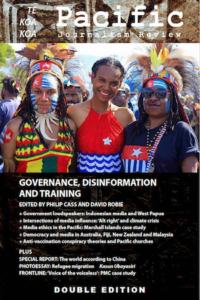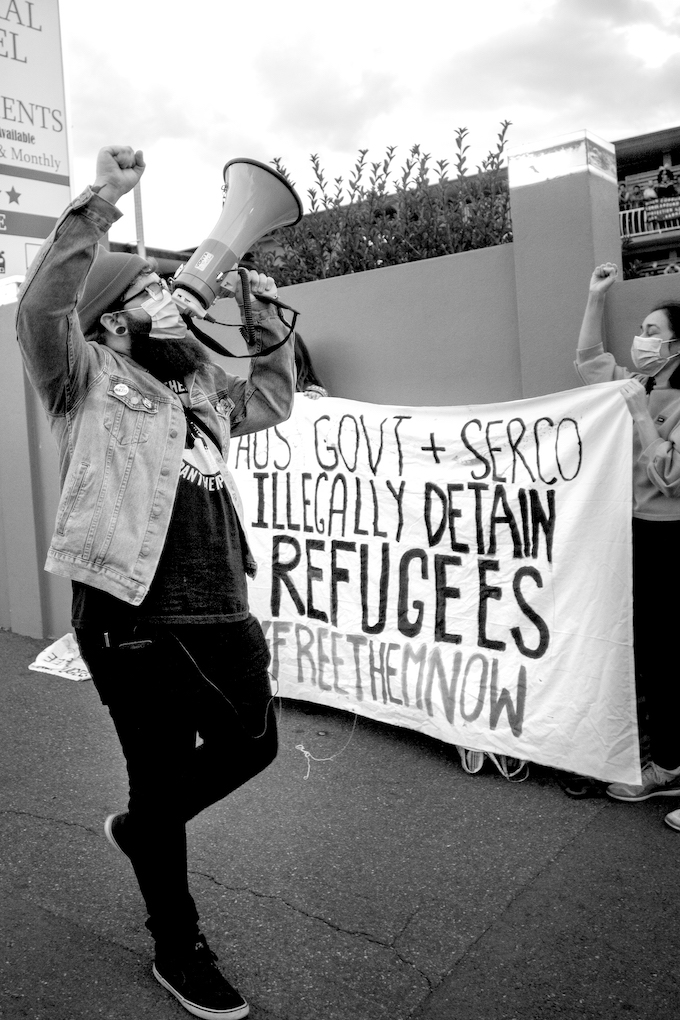Research on climate crisis as the new target for disinformation peddlers, governance and the media, China’s growing communication influence, and journalism training strategies feature strongly in the latest Pacific Journalism Review.
Byron C. Clark, author of the recent controversial book Fear: New Zealand’s Hostile Underworld of Extremists, and Canterbury University postgraduate researcher Emanuel Stokes, have produced a case study about climate crisis as the new pandemic disinformation arena with the warning that “climate change or public health emergencies can be seized upon by alternative media and conspiracist influencers” to “elicit outrage and protest”.
The authors argue that journalists need a “high degree of journalistic ethics and professionalism to avoid amplifying hateful, dehumanising narratives”.

PJR editor Dr Philip Cass adds an article unpacking the role of Pacific churches, both positive and negative, in public information activities during the COVID-19 pandemic.
Several articles deal with media freedom in the Pacific in the wake of the pandemic, including a four-country examination by some of the region’s leading journalists and facilitated by Dr Amanda Watson of Australian National University and associate professor Shailendra Singh of the University of the South Pacific.
They conclude that the pandemic “has been a stark reminder about the link between media freedom and the financial viability of media of organisations, especially in the Pacific”.
Dr Ann Auman, a specialist in crosscultural and global media ethics from the University of Hawai’i, analyses challenges facing the region through a workshop at the newly established Pacific Media Institute in Majuro, Marshall Islands.
Repeal of draconian Fiji law
The ousting of the Voreqe Bainimarama establishment that had been in power in Fiji in both military and “democratic” forms since the 2006 coup opened the door to greater media freedom and the repeal of the draconian Fiji Media Law. Two articles examine the implications of this change for the region.
An Indonesian researcher, Justito Adiprasetio of Universitas Padjadjaran, dissects the impact of Jakarta’s 2021 “terrorist” branding of the Free West Papua movement on six national online news media groups.
In Aotearoa New Zealand, media analyst Dr Gavin Ellis discusses “denying oxygen” to those who create propaganda for terrorists in the light of his recent research with Dr Denis Muller of Melbourne University and how Australia might benefit from New Zealand media initiatives, while RNZ executive editor Jeremy Rees reflects on a historical media industry view of training, drawing from Commonwealth Press Union reviews of the period 1979-2002.

Across the Tasman, Griffith University communication and journalism programme director Dr Kasun Ubayasiri presents a powerful human rights Photoessay documenting how the Meanjin (Brisbane) local community rallied around to secure the release of 120 medevaced refugee men locked up in an urban motel.
Monash University associate professor Johan Lidberg led a team partnering in International Federation of Journalists (IFJ) studies about “the world according to China”, the global media influence strategies of a superpower.
The Frontline section features founding editor Dr David Robie’s case study about the Pacific Media Centre which was originally published by Japan’s Okinawan Journal of Island Studies.
A strong Obituary section featuring two personalities involved in investigating the 1975 Balibo Five journalist assassination by Indonesian special forces in East Timor and a founder of the Pacific Media Centre plus nine Reviews round off the edition.
Pacific Journalism Review, founded at the University of Papua New Guinea, is now in its 29th year and is New Zealand’s oldest journalism research publication and the highest ranked communication journal in the country.
It is published by the Asia Pacific Media Network (APMN) Incorporated educational nonprofit.
This post was originally published on Asia Pacific Report.